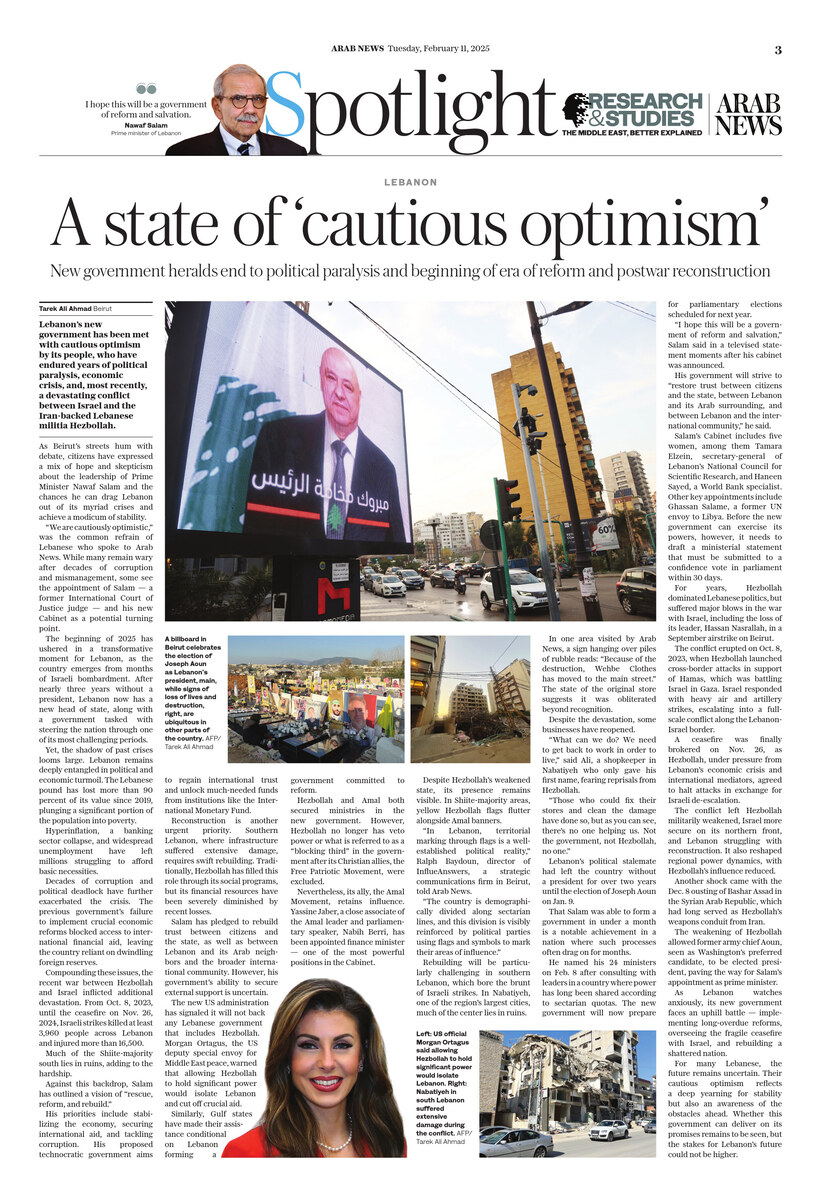BEIRUT: Hezbollah said on Saturday that it struck the Ayelet Hashahar kibbutz in northern Israel in retaliation for a new massacre in southern Lebanon.
The Israeli military said that two soldiers were wounded in a rocket attack from Lebanon, adding that a total of 55 rockets had been fired in the latest strikes.
Hezbollah said that its attack came in response to “the Israeli army’s assaults on the Kfour village in Nabatieh, north of the Litani Line, earlier on Saturday, killing 10 people, including Syrian children and their mother, and injuring others, including Sudanese workers.”
Hezbollah said that it added Ayelet HaShahar to its firing schedule and struck the settlement with Katyusha rockets for the first time.
According to Hezbollah’s military media, the settlement “is located northeast Safad in the upper Galilee and some 10 km from the Lebanese southern border.”
In another statement, Hezbollah announced “targeting a gathering of Israeli soldiers in the Al-Burj site with two attack drones, hitting it directly.”
Israeli media outlets said that “the barrage of rockets fired from Lebanon toward the north landed in areas that weren’t evacuated, causing fires to erupt.”
They added that “violent explosions were heard in Safad and its surroundings, in addition to heavy shelling with dozens of rockets launched from Lebanon toward the upper Galilee, causing casualties.
“Ambulances headed to the perimeter of the Mahanayim intersection, while the Hatzor HaGlilit area experienced a power outage following the bombing.”
Israeli Army Radio said that “around 40 rockets were launched from Lebanon toward the upper Galilee.”
The Israeli media reported that “a drone exploded in Margaliot, the upper Galilee,” adding that “settlers of areas located in the Hula valley in the upper Galilee were instructed to stay near shelters.”
Tension escalated on the Lebanese southern border on Friday night and Saturday morning, as 10 people died in Kfour, Nabatieh, as a result of an Israeli raid that targeted a building in the village.
The raid hit a cement stone factory in the industrial zone of Toul-Kfour.
It is the second Israeli attack on the village, hundreds of meters from a previous raid that destroyed a house last week.
The raid killed an entire Syrian family, comprised of the factory’s janitor, the mother, and their children, and injured others, including Syrian and Sudanese workers.
Rescuers worked on lifting the rubble until the morning.
The Ministry of Health’s emergency operations center said that the raid killed 10 people, including a woman and her two children, and injured five others, including two critical injuries.”
Israeli army spokesperson Avichay Adraee claimed that the forces “raided a Hezbollah weapons storage.”
Adraee said that several raids targeted “Hezbollah military buildings in Hanine and Maroun Al-Ras” on Friday night and Saturday morning.
The Israeli army immediately responded to the attack that targeted the new settlement, as a military drone struck a motorcycle northeast of Tyre, killing one person, according to the emergency operations center.
According to the center, the Israeli shelling of border villages caused injuries to a citizen in Khiam.
It resulted in the death of one person and the injury of another in an Israeli airstrike in Aitaroun.
Hezbollah’s release of a video on Friday showing tunnels it uses for military purposes in the mountains sparked criticism from Lebanese people on social media, including opposition politicians and activists.
The head of the Lebanese Forces Party, Samir Geagea, said: “Hezbollah has no right, even if it has one or more underground facilities, to single-handedly decide the fate of the Lebanese people.”
Fares Souaid, the head of the “Lady of the Mountain” Gathering, described the tunnel video as “fake.”
Political analyst Khaled Mumtaz stated that the video was an unjustified revelation.
He believes it reflects a desperate attempt to regain prestige against the Israelis.
He said the Israelis struck the party in its stronghold and killed its general commander. So far, Mumtaz said the party had been unable to respond or boost the morale of its community and fighters.
University academic Makram Rabah addressed Hezbollah, saying: “If you can build such tunnels, why didn’t you build shelters in the south? It is an unethical act.”
Also on Saturday, the UN Office for the Coordination of Humanitarian Affairs, or OCHA, reported that the number of displaced people from the southern border area had risen to more than 110,000 as the exchange of fire continued between the Israeli army and Hezbollah.
Lebanese government statistics indicated 97,000 people were displaced from the south as of last month.
In its latest update, OCHA stated that “35 percent of the displaced are children,” adding that estimates suggest that about 150,000 people remained in the border areas of southern Lebanon.
“According to the World Health Organization, 16 attacks on health care have been reported since October last year, and 21 paramedics have been killed in hostilities. Severe damage to water, electricity, telecoms infrastructure, and roads in southern Lebanon have been recorded.”
OCHA said food insecurity had worsened, with 23 percent of the population now affected, up from 19 percent in March.
“The UN and partners continue to scale up relief efforts to support the government-led response. But additional funding is urgently needed. Humanitarian partners need $110 million for ongoing response for conflict-affected people until the end of the year,” OCHA said.





































